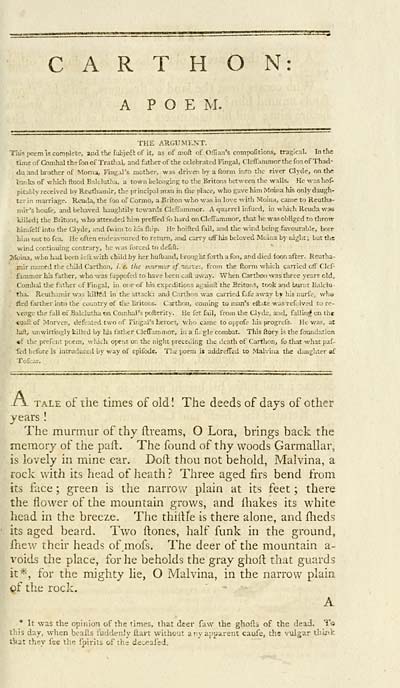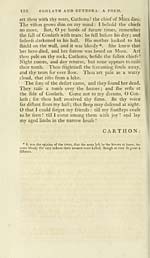Download files
Complete book:
Individual page:
Thumbnail gallery: Grid view | List view

C A R T H O N:
A P O E M.
THE ARGUxMENT.
Tiiis poem is complete, and the fubjeft of it, as of m oft of O/fian's compofitions, tragical. In the
time of Comhal the fon of TrathaV and father of the celebrated Fingal, Cleffammor the fon of Thad-
du and brother of Moma, Fingal's mother, was driven by a ftorm into the river Clyde, on the
hanks of which ftood Balclutha, a town belonging to the Britons between the walls. He washof-
pitablv received by Reuthamir, the prmcipal man in the place, who gave liimMoina his only daugh-
ter in marriage. Rcuda, the fon of Cormo, a Briton who was in love with Moina, came to Reutha-
mh'shoufe, and behaved haughtily towards Cleffammor. A quarrel infued, hi wliich Reuda was
killed; the Britons, who attended him preffed fo hard on ClelTamraor, that he was obliged to throw
hin.felf into the Clyde, and fwim to his fhip. He hoifted litil, and the wind bemg favourable, bore
hiai out to fe.x Me often endeavoured to return, and carry off his beloved Moina by night ; but tlie
wind continuing contrary, he was forced to defift.
>Ioina, who had been left with child by her hufbLmd, brought forth a fon, and died loon after. Reutha-
mir named the cliild Carthon, ;'. e. thd murmur of iv.nes, from the ftorm which (parried off Clef-
fammor his father, who was fappofed to have been caft away. When Carthon was three years old.
Comhal tlie father of Fingal, in oiieflf his expeditions againll: the Britons, took and burnt Balclu-
tha. Reuthamir was killed in the attack: and Carthon was carried f.de away by his nurfe, wha
fled fiirthcr into the country of the EritoiiS. Carthon, coming toman's eft.^te wasrefulved to re-
\enge the fall of Balclutha on Comhal's pofterity. He fet fell, from the Clyde, and, falling en the
■toali of Morven, defeated two of Fingal's heroes, who came to oppofe his progrefs. He was, at
lalt, unwittingly killed by lijs father Cleffimimor, in a fii gle combat. This ftory is the foundation
•f the prefeiit pcem, winch operis on the night preceding the death of CarthoHj fo that what paf-
fed before is introduced by -way of epifode, The poem is addreffed to Malvuia tlie daughter of
Tofcar.
.l\- tale of die times of old! The deeds of days of other
years I
The murmur of thy ftreams, O Lora, brings back the
memory of the pail. The found of thy woods Garmallar,
is lovely in mine ear. Doft thou not behold, Malvina, a
rock with its head of heath ? Three aged firs bend from
its face ; green is the narrow plain at its feet ; there
the flower of the mountain grows, and ihakes its white
head in the breeze. The thiille is there alone, and fheds
its aged beard. Two ftones, half funk in the ground,
fhew their heads of .mofs. The deer of the mountain a-
voids the place, for he beholds the gray ghoft that guards
it*, for the mighty lie, O Malvina, in the narrow plain
<pf the rock. ' -• ■■
* It was the opinion of the times, that deer faw the ghofts of the dead. To
this day, when bcafls luddenJy Hart without any apparent caufe, the \'ulgar thijife-
that they fee the fpirits of th: deoeafcd.
A P O E M.
THE ARGUxMENT.
Tiiis poem is complete, and the fubjeft of it, as of m oft of O/fian's compofitions, tragical. In the
time of Comhal the fon of TrathaV and father of the celebrated Fingal, Cleffammor the fon of Thad-
du and brother of Moma, Fingal's mother, was driven by a ftorm into the river Clyde, on the
hanks of which ftood Balclutha, a town belonging to the Britons between the walls. He washof-
pitablv received by Reuthamir, the prmcipal man in the place, who gave liimMoina his only daugh-
ter in marriage. Rcuda, the fon of Cormo, a Briton who was in love with Moina, came to Reutha-
mh'shoufe, and behaved haughtily towards Cleffammor. A quarrel infued, hi wliich Reuda was
killed; the Britons, who attended him preffed fo hard on ClelTamraor, that he was obliged to throw
hin.felf into the Clyde, and fwim to his fhip. He hoifted litil, and the wind bemg favourable, bore
hiai out to fe.x Me often endeavoured to return, and carry off his beloved Moina by night ; but tlie
wind continuing contrary, he was forced to defift.
>Ioina, who had been left with child by her hufbLmd, brought forth a fon, and died loon after. Reutha-
mir named the cliild Carthon, ;'. e. thd murmur of iv.nes, from the ftorm which (parried off Clef-
fammor his father, who was fappofed to have been caft away. When Carthon was three years old.
Comhal tlie father of Fingal, in oiieflf his expeditions againll: the Britons, took and burnt Balclu-
tha. Reuthamir was killed in the attack: and Carthon was carried f.de away by his nurfe, wha
fled fiirthcr into the country of the EritoiiS. Carthon, coming toman's eft.^te wasrefulved to re-
\enge the fall of Balclutha on Comhal's pofterity. He fet fell, from the Clyde, and, falling en the
■toali of Morven, defeated two of Fingal's heroes, who came to oppofe his progrefs. He was, at
lalt, unwittingly killed by lijs father Cleffimimor, in a fii gle combat. This ftory is the foundation
•f the prefeiit pcem, winch operis on the night preceding the death of CarthoHj fo that what paf-
fed before is introduced by -way of epifode, The poem is addreffed to Malvuia tlie daughter of
Tofcar.
.l\- tale of die times of old! The deeds of days of other
years I
The murmur of thy ftreams, O Lora, brings back the
memory of the pail. The found of thy woods Garmallar,
is lovely in mine ear. Doft thou not behold, Malvina, a
rock with its head of heath ? Three aged firs bend from
its face ; green is the narrow plain at its feet ; there
the flower of the mountain grows, and ihakes its white
head in the breeze. The thiille is there alone, and fheds
its aged beard. Two ftones, half funk in the ground,
fhew their heads of .mofs. The deer of the mountain a-
voids the place, for he beholds the gray ghoft that guards
it*, for the mighty lie, O Malvina, in the narrow plain
<pf the rock. ' -• ■■
* It was the opinion of the times, that deer faw the ghofts of the dead. To
this day, when bcafls luddenJy Hart without any apparent caufe, the \'ulgar thijife-
that they fee the fpirits of th: deoeafcd.
Set display mode to: Large image | Transcription
Images and transcriptions on this page, including medium image downloads, may be used under the Creative Commons Attribution 4.0 International Licence unless otherwise stated. ![]()
| Early Gaelic Book Collections > Ossian Collection > Poems of Ossian, the son of Fingal > (125) |
|---|
| Permanent URL | https://digital.nls.uk/77584151 |
|---|
| Description | Selected books from the Ossian Collection of 327 volumes, originally assembled by J. Norman Methven of Perth. Different editions and translations of James MacPherson's epic poem 'Ossian', some with a map of the 'Kingdom of Connor'. Also secondary material relating to Ossianic poetry and the Ossian controversy. |
|---|
| Description | Selected items from five 'Special and Named Printed Collections'. Includes books in Gaelic and other Celtic languages, works about the Gaels, their languages, literature, culture and history. |
|---|

